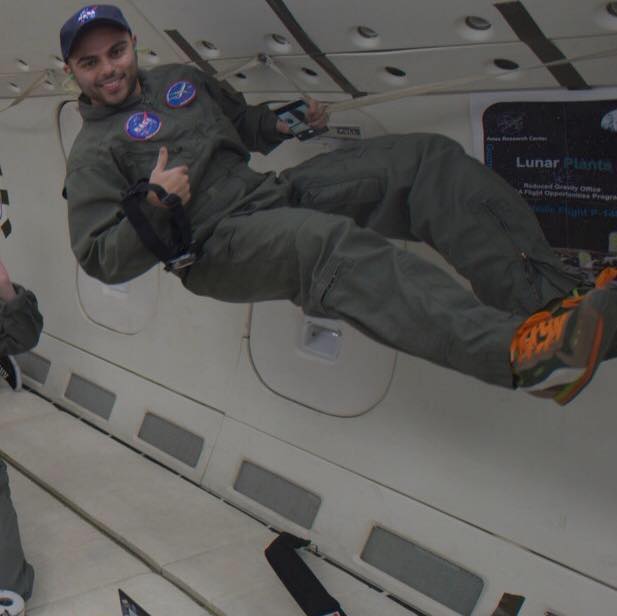Alumnus Spotlight: Arash Alex Mazhari
Current Position
Manager, SpaceShop Rapid Prototyping Facility, NASA Ames Research Center
Education
B.S. Aerospace Engineering, San Jose State University
M.S. Aerospace Engineering, San Jose State University
Ph.D. Computer Engineering, UC Santa Cruz (expected, 2021)
Bio
I started interning under the helm of Professor Marcus Murbach during my undergraduate propulsion course in 2013. He required an AE student to help with a few of his projects, notably a smallsat ejector tailored for missions to Mars, the Atromos Mars Lander, and some general work with TechEdSat. Some of the work required low-fidelity prototyping, and consequent to that was my introduction to the Ames rapid prototyping lab. I noticed that I understood relatively little regarding the term manufacturability, and consequently decided to request an internship with the SpaceShop instead. Professor Murbach had plenty of my fellow Spartans in queue willing to intern with him at Ames, so when the opportunity to intern at the SpaceShop arose there were no hard feelings (I still play soccer with Marcus at Ames. He gets scared when I get on the field.)
I interned at the SpaceShop for a few months, working 30+ hours / week simultaneous to taking 6-7 courses a semester at SJSU before converting to a full-time engineer when I received my Bachelor’s. When the then manager left, I was promoted and did that while working on my Master’s. Three semesters later, I looked to continue some of the amazing work I was involved in for my graduate research and consequently decided to apply for relatively local Doctoral programs. In early 2016 I was admitted to the Ph.D. program in Computer Engineering at UCSC to focus on control system development for unconventional aircraft. I am currently working full-time both on my Ph.D. coursework and my career at NASA.
What do you do at work?
I run the rapid prototyping facility at Ames Research Center. This responsibility requires the application of my entire engineering curriculum at SJSU over both grad and undergrad to sustainably consult NASA’s diverse prototyping needs. The facility is unique, in that it is the first fully-open makerspace in the Federal Government! This means that we are able to train and certify everyone on base on various forms of CNC equipment, enabling personnel to iteratively prototype hands-on, in-house. While promoting workforce development, this process has also shown to reduce project turnaround times and increase efficiency of taxpayer dollars.
The job required me to become a subject matter expert in additive manufacturing (commonly referred to as ‘3D Printing’). I help the agency support innovative solutions enabled by derivatives of the technology as ARC’s representative for NASA’s Additive Manufacturing Work Group (AMWG).
What are you most passionate about in your work? Why?
I get to engineer solutions for hundreds of projects a year! This requires me to constantly think on my feet and appreciate the vast array of research conducted by the agency. From items that will be interacted with by astronauts, to spacecraft destined for other planets, novel aerostructures, and even unconventional rovers, I am extremely lucky to be able to support brilliant people working on some of the coolest things!
How has your SJSU AE experience helped shape your success?
Being a Spartan helped me understand how important it was to pair practical work experience with academic excellence. This doesn’t necessarily mean getting onto the Dean’s honor roll per se, and has more to do with paying attention to the details in the engineering curriculum and comprehending the fundamentals taught in coursework. I regularly use a combination of mechanics, materials science, and numerous aerodynamic principals to on-the-spot solutions to challenging problems. If my AE coursework had not required my exposure to these objectives, I am positive I would still not be qualified to do what I do.
What advice do you have for aspiring AEs?
SJSU, placing the most engineers into the Silicon Valley, has strong industrial ties. There is a relatively large presence of career-related clubs on campus (AIAA, IEEE, SCE, etc.). These clubs not only helped me gain exposure to what potential employers required from aspiring engineers, but provided invaluable networking opportunities as well. Spend less time with video games, more in relevant clubs with like-minded peers, and you’ll help yourself increase your employability at an otherwise unprecedented rate. Apply for and call numerous internships early, and often. You’re more employable than you probably think you might be!
Try not to complain about ‘how hard’ aerospace engineering is. Of course it is; we’re the relevant profession for rocket science (look it up). If you’re looking for an easy four-six years of college, then you’re in the wrong field. If you’re willing to dedicate at least 20-30 hours / week to your courses (minimum), sticking through this field will be one of the most rewarding achievements of your life! If you have the motivation and the time, but claim you are ‘just not good at math or physics’: you can learn those subjects if you devote enough time and take advantage of the numerous resources available to you on campus.
Your peers are your friends: help each other! I kept a group of five close friends throughout my undergraduate courses, all the way through master’s degree graduation. We helped each other get through schoolwork, and are now helping each other with our careers.
Anything else you’d like to add?
Go Spartans!